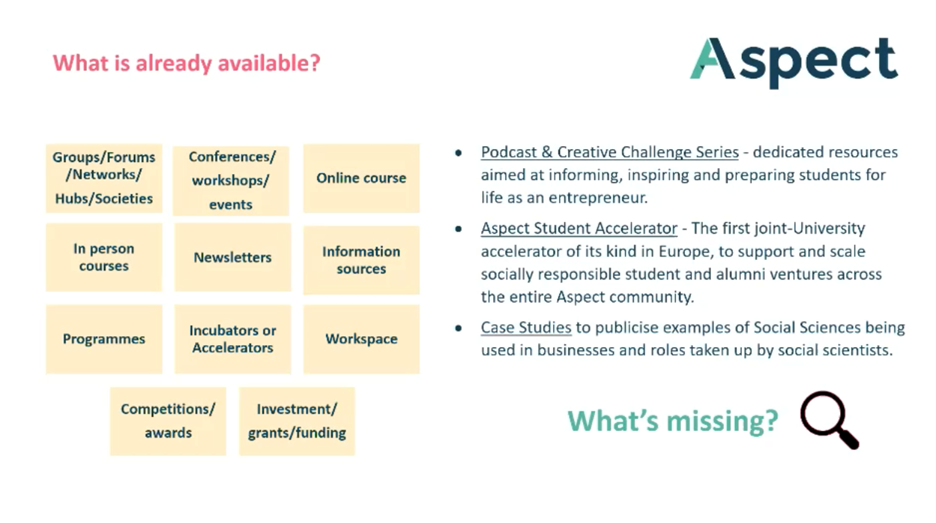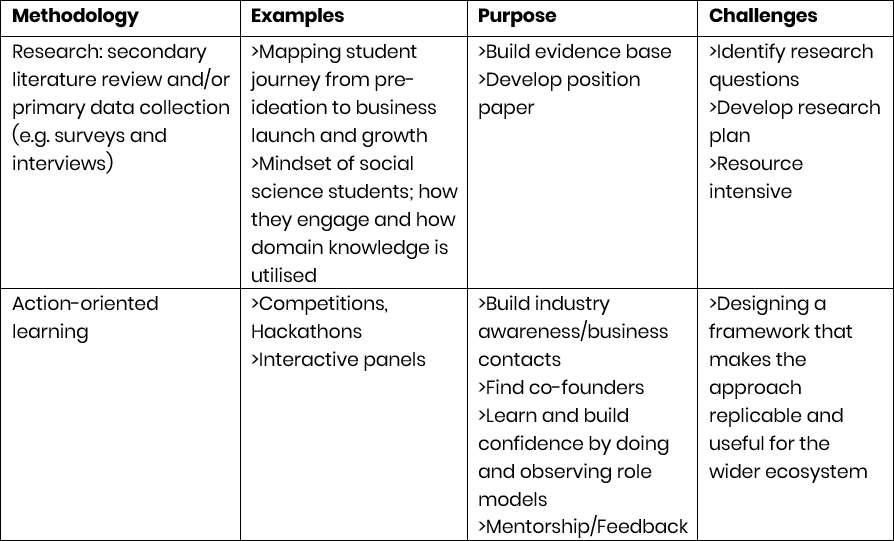The Aspect Entrepreneurship Community of Practice provides a space for member institutions to share learnings and best practices on encouraging social science students and alumni to consider entrepreneurship as a means for enacting impact and change.
The underlying premise is that there is something different about social science entrepreneurship, warranting different approaches for engagement and support. Therefore, identifying the points of difference would make a clear case for the challenges that need to be addressed to improve engagement and support. However, the fundamental question of “What is different about social science entrepreneurship?” remains elusive. It is within this context that the Community of Practice led a knowledge sharing Q&A session.
A working definition for social science entrepreneurship
The first part of the session aimed to develop a working definition of social entrepreneurship to use as a basis for discussion, resulting in the following:
Social science is, in its broadest sense, the study of society and the manner in which people behave and influence the world around us. Social science entrepreneurship is the creation of ventures, services or products i) by founders with a background in the social sciences, or ii) by multi-disciplinary teams with businesses models and processes are rooted in social sciences. University teams who support social science entrepreneurship aim to encourage social science students and alumni to consider entrepreneurship as a means for enacting impact and change, while also supporting entrepreneurs from non-social science backgrounds to adopt social science methodologies into their ventures.
In drafting this definition, members shared differing views on a few areas, which may offer a frame of reference for university entrepreneurship hubs seeking to develop support for social science entrepreneurs.
1. Value judgment
There exists an inclination to associate social science entrepreneurship with “social enterprise,” “impact” or “socially responsible business.” For example, Aspect member LSE frames their start-up competition around social impact and building socially responsible businesses. The draft definition for social science entrepreneurship developed during the session also points to “enacting impact and change,” based on the members’ shared ideal of seeing students found impactful businesses.
However, fellow Aspect member the University of Manchester points out that any domain, including the social sciences, may be used for positive impact or otherwise. Including impact in the definition of social science entrepreneurship inherently entails a value judgement. Therefore, the extent of aligning social science entrepreneurship with impact may depend on particular institutional values and culture, as well as those of the students.
2. Social science businesses vs. social science entrepreneurs
Social science businesses are those with business models or processes rooted in the domain of social science (e.g. a small policy consultancy).
Social science entrepreneurs are founders with a background in the social sciences but may or may not found businesses with business models or processes rooted in the domain of social science.
Some members contended that it is social science businesses, not social science entrepreneurs per se, that require a different approach to engagement and support. The argument is that, for example, business and management students fall within the social sciences and if they become founders, they would be considered social science entrepreneurs, but these students are relatively well-versed in business and entrepreneurship and would not require different support.
For the purposes of the Community of Practice, the decision was made to include support for both social science businesses and entrepreneurs in the working definition.
Students from social science disciplines are not as entrepreneurial?
Next, the session moved to discussing the particular challenges faced by social science students in their prospective path to entrepreneurship.
The myth or stereotype that students from the social science disciplines are not as entrepreneurial was immediately challenged by members. Bristol and Oxford both noted that social science students are some of the most interested in entrepreneurship, and may exemplify more “entrepreneurial” or “enterprising” qualities than their science or STEM counterparts because they often have to find ways to work around the system rather than within it.
Bristol shared an observation that social science students more often found or co-found non-social science business, such as tech start-ups. In contrast, STEM students typically found or co-found businesses directly related to their domain of study (e.g. chemistry students found chemistry-based businesses). Therefore, social science entrepreneurs tend to apply less domain knowledge and in turn may be considered more “entrepreneurial” in their agility to move across domains.
The fact that social science students may not identify as readily with the conventional language of entrepreneurship does not mean that they are not entrepreneurial (see Aspect Entrepreneurship Community of Practice session on the language of entrepreneurship).
Key challenges
The session identified three key challenges that need to be addressed in developing or adapting university entrepreneurship support for social science entrepreneurs:
- Building a founding team with the appropriate mix of skills represented
Bristol noted that social science students tend to start with a theoretical basis to solving a problem, while lacking practical skills to get the idea off the ground (e.g. technology expertise to build a minimum viable product) or get funding (e.g. business plan development, fundraising skills). - Lack of industry awareness/business contacts
This relates to the first point as well as the observation that social science entrepreneurs tend to found businesses outside of their domain. Starting a business outside one’s domain typically means one cannot rely on pre-existing networks and knowledge for industry awareness and contacts. This disadvantages founders in their ability to develop and refine early ideas and identify initial partners, clients or investors. - Students do not identify with the language of entrepreneurship
The discussion also highlighted the challenge of access to capital for entrepreneurs after exhausting a small seed round of investment, resulting in a significant rate of attrition. LSE noted that this challenge may be particularly acute for social science businesses because they tend to be less investor-ready at an early stage, requiring more years of development before becoming attractive to investors.

What can be done?
Finally, the session asked members to develop ideas for resources that would benefit those who seek to support social science entrepreneurship in the wider entrepreneurship ecosystem. Figure 1 shows a slide from the presentation, laying out the range of support that Aspect member institutions already offer through their respective university entrepreneurship hubs, as well as the Aspect Student Accelerator—the first joint-university accelerator of its kind in Europe.

Table 1 outlines research-based vs. action-oriented methods to developing new resources that would benefit the wider ecosystem of university entrepreneurship hubs looking to build support for social science entrepreneurship. Research-based approaches would enable the building of an evidence base that could be shared to inform programme design and communicate the case to investors and institutional finance and management divisions. On the other hand, action-oriented approaches would tend to directly benefit and impact the students, with the challenge for the Community Practice being creating a replicable framework that would be valuable for the wider ecosystem.
Conclusion
The value of Aspect’s Entrepreneurship Community of Practice is bringing together institutions that are driven by the goal of developing better support for social science entrepreneurship to facilitate knowledge sharing and co-develop resources that can be leveraged by the wider ecosystem, as well as serve as a foundation for sustaining progress towards this goal.
While the fundamental question of “What is social science entrepreneurship?” remains elusive and each institution will ultimately have to go through a similar exercise to answer the question for themselves, the working definition drafted through a collaborative and deliberative process in this session offers a common basis for moving the conversation forward.
Photo Credit Ivy Son via Pexels




